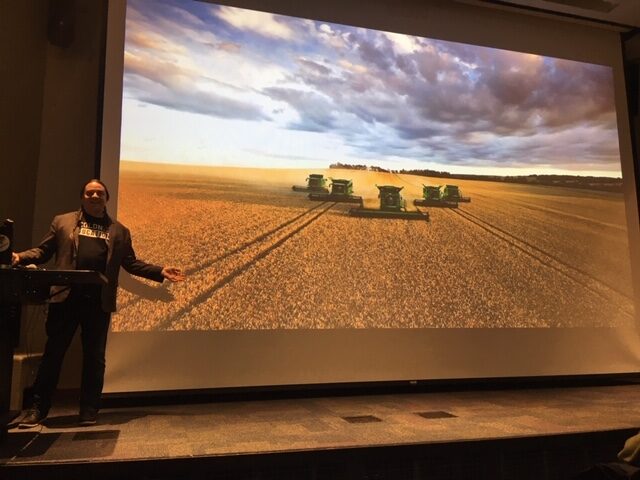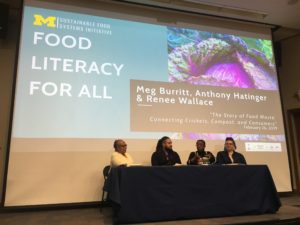
Sean Sherman delivers his lecture “The (R)evolution of Indigenous Food Systems of North America.”
In a world where we’re experiencing both a global rise in obesity and widespread hunger, it becomes important to understand how food systems affect us.
More Info
Presented by the University of Michigan Sustainable Food Systems Initiative, Food Literacy for All is a course covering the complexities and deficiencies of our global food system. The course focuses on community engagement, and reserves half its lecture hall seats for community members who’d like to attend for free.
It is jointly taught by Lesli Hoey, assistant professor in Taubman College of Architecture and Urban Planning, Jerry Ann Hebron, executive director of the Oakland Avenue Farm in Detroit and Lilly Fink Shapiro, program manager for U-M Sustainable Food Systems Initiative.
Q: What is the course Food Literacy for All about?
Lilly Fink Shapiro: Food Literacy for All focuses on different food systems themes each week. We invite food systems leaders from around the country and world to come and teach the class every Tuesday evening. A few themes from this semester include revitalizing indigenous cuisine, the consolidation of power throughout the food system, the use of pesticides in industrial agriculture, food waste, women farmworkers and the politics of seeds.
Q: What are the upcoming lectures about?
Fink Shapiro: On April 16 we’ll have a panel called “Radicalizing Food Systems Education: Perspectives from Detroit to Chiapas.” For our last class on April 23, New York Times best-selling author Paul Greenberg will speak about his book “Four Fish: The Future of the Last Wild Food.” Often when we think about food systems we’re focused on land-based activities, but a huge part of our food system is based in the water.
Q: What are the key takeaways you hope for people to learn from this course?
Fink Shapiro: Education has great power to inspire and motivate. The Food Literacy for All course builds the capacity of current and future food system leaders in Detroit, Ann Arbor, Michigan and beyond. We hope the class inspires students and community attendees to get involved in the food system through study, volunteer opportunities and careers. U-M now offers an undergraduate minor in “Food and the Environment” and a graduate certificate in Sustainable Food Systems.

Meg Burritt, Anthony Hatinger and Renee Wallace discuss the story behind food waste.
After last year’s Food Literacy course, we distributed a survey and asked students and community attendees to share their biggest takeaways from from the course. The most salient theme by far was food justice and equity. The second most reported theme was the value of community-based work. We’re really intentional about the fact that experts are not only at the university or in academia. There’s expertise everywhere. We want to value that and lift up those community and indigenous voices.
Q: Why do you think this is an important topic for people to learn about?
Fink Shapiro: Everyone who eats interacts with the food system every single day. One major theme in this class is about understanding the systemic inequities in our food system, which affects who has access to food, land and power. I think it’s important for people to understand the policy implications in the food system, whether at the local, state, national or institutional level. The class helps student and community learners understand that how and what we eat has implications far beyond the plate.
Q: Something unique about this course is the way in which it’s run. The leadership team includes both community and academic experts. Why was it structured in this way, and what impact has it had on the class?
Fink Shapiro: This class has a community-academic leadership team, which means its co-designed, co-taught and co-led by both university and community leadership. Planning the entire course is a team effort. Thinking about the community is a central mission to our class, and that’s we wanted to bring in expertise and perspective from community activists in addition to academics and journalists. Another crucial part of our mission is engaging Detroiters. There’s no way we’d have so much engagement with Detroiters and community members if Detroiters didn’t play a central role on our leadership team.
In addition to Jerry Ann Hebron at Oakland Ave. Farm, we work closely with the Detroit Food Policy Council, FoodLab Detroit and the Detroit Black Community Food Security Network.
Q: Is there a way to watch the lectures if you’re unable to attend in person?
Fink Shapiro: Yes! Each class session is filmed and available for free on YouTube.
RSVP here to attend a Food Literacy for All lecture.


